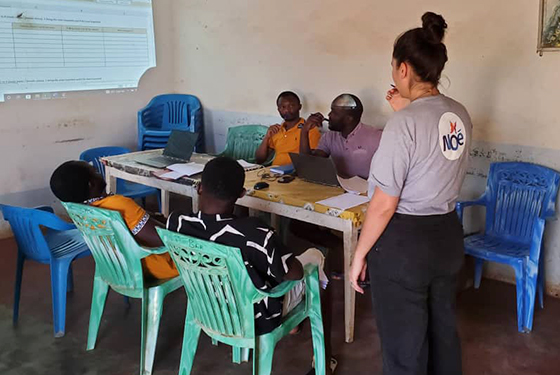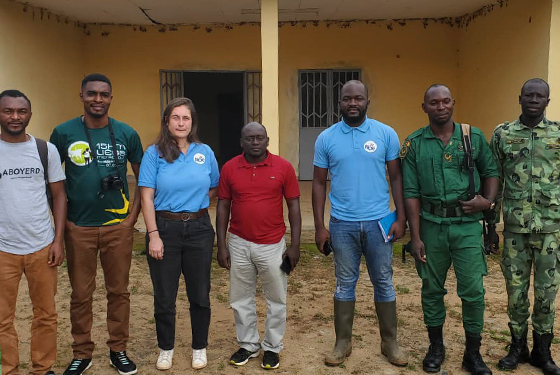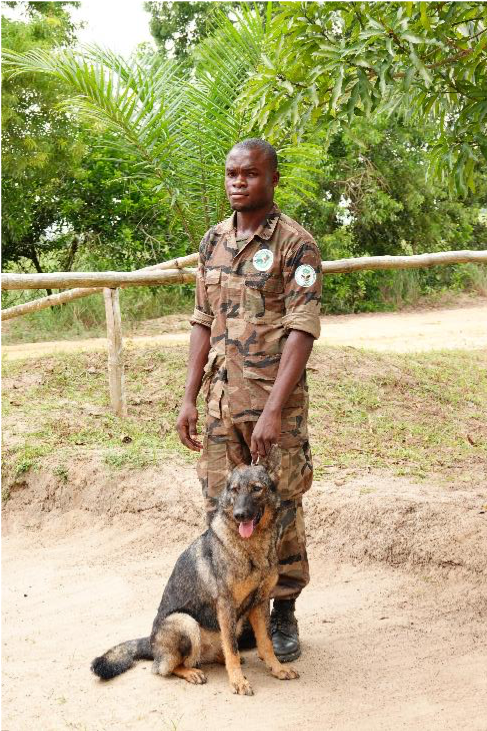In Cameroon: changing behavior to reduce pressure on the pangolin
In close collaboration with our partner, Noé and the NGO ABOYERD (Agriculture and Bio-conservation Organization for Youth Empowerment and Rural Development), work for the conservation of three species of pangolins by adopting a holistic approach: the giant pangolin (Smutsia gigantea), the small-scaled pangolin (Phataginus tricuspis) and the long-tailed pangolin (Phataginus tetradactyla) in and around the Mbam and Djerem National Park.Knowing the pangolin in Cameroon to protect it
ABOYERD implements ecological monitoring of pangolins (e.g. by using camera traps, reconnaissance surveys or transects) to monitor changes in pangolin populations effectively.

Our partner is also working on the restoration of natural pangolin habitats. ABOYERD maps the degraded habitats of these animals and creates nurseries whose young trees are then reintroduced into the natural environment to renew the pangolins' habitat.
ABOYERD also assesses bushmeat consumption, as pangolins are also hunted for food. To this end, ABOYERD is conducting two studies in the communities around the park (17 villages) to better understand how they exploit wildlife (local knowledge, hunting techniques, quantification of the level of harvesting, harvesting rates, etc.). The aim is to use the knowledge gained from these studies to develop alternative and viable solutions to combat the over-exploitation of wildlife. The results of the studies conducted by ABOYERD will be shared through publications in journals.
Raising community awareness to better engage them in pangolin protection
ABOYERD and Noé are working together on a behavioral change campaign to reduce the hunting and consumption of pangolins in seven villages along the park's shores, while at the same time raising awareness about the protection of this animal among the local communities.

The « Pangolin Clubs »
With the support of Noé, ABOYERD runs three "Pangolin Clubs" for young people (two clubs in secondary schools; one club in a primary school). Thanks to the involvement of committed science teachers, various activities are devised to raise awareness among these children and teenagers about the protection of pangolins: learning about biodiversity conservation, drawing competitions, theatre, excursions and wildlife observations, etc.
Many students are unaware of the importance of the pangolin and have grown up seeing it as a food resource. The clubs aim to teach them about pangolins, the importance of their presence in the forests, the threats to these animals and the actions they can take to help protect them.
On 11 February, Youth Day celebrated throughout Cameroon, the young members of these clubs marched through the centre of Yoko (a commune in the Centre region) and displayed placards to raise awareness about the situation of pangolins and call for their protection by stopping poaching and the consumption of their meat.
This is a playful way of mobilising young people to protect biodiversity, who act as real ambassadors to their peers and parents.

These different actions that Noé and its local partner are carrying out in Cameroon with the support of Noé, aim to improve knowledge of the presence and distribution of pangolins around the Mbam and Djerem National Park and to involve the communities, including the youngest, in actions to preserve the pangolin and its habitat, which will also benefit other threatened animal species in these territories.
Increasing knowledge of the pangolin, raising community awareness and campaigning for less bushmeat consumption will help reduce the trafficking and poaching of these mammals. In the long term, Noé and ABOYERD hope to develop this holistic approach to the entire periphery of the park to ensure effective and sustainable protection of the pangolin.
The protection of this mammal also involves the implementation of pro-biodiversity sectors (in this case, beekeeping, njansang and kimba cultivation) to offer the communities living near the park sustainable sources of income that respect biodiversity, thus disengaging them from poaching and the over-exploitation of natural resources. Today, 300 community members are involved with ABOYERD and Noé in these sustainable value chains.
The Mbam and Djerem National Park
With a surface area of 416,512 ha, is located on the southern slope of the Adamaoua plateau and at the northern limit of the closed canopy rainforest of the Congo basin. It has the greatest diversity of habitats of any protected area in Cameroon. The threats to biodiversity are diverse: illegal bushmeat hunting, unsustainable agricultural activities, illegal logging, etc.

Our actions in Congo in favour of the pangolin
 Within the Conkouati-Douli National Park (Congo), which Noé manages through its Parcs de Noé programme, actions are also undertaken to protect the pangolin.
Within the Conkouati-Douli National Park (Congo), which Noé manages through its Parcs de Noé programme, actions are also undertaken to protect the pangolin.
The small-scaled pangolin and the long-tailed pangolin are notably present in the park and are subject to anti-poaching patrols. An on-site dog squad is able to detect pangolin scales removed from poached animals.



